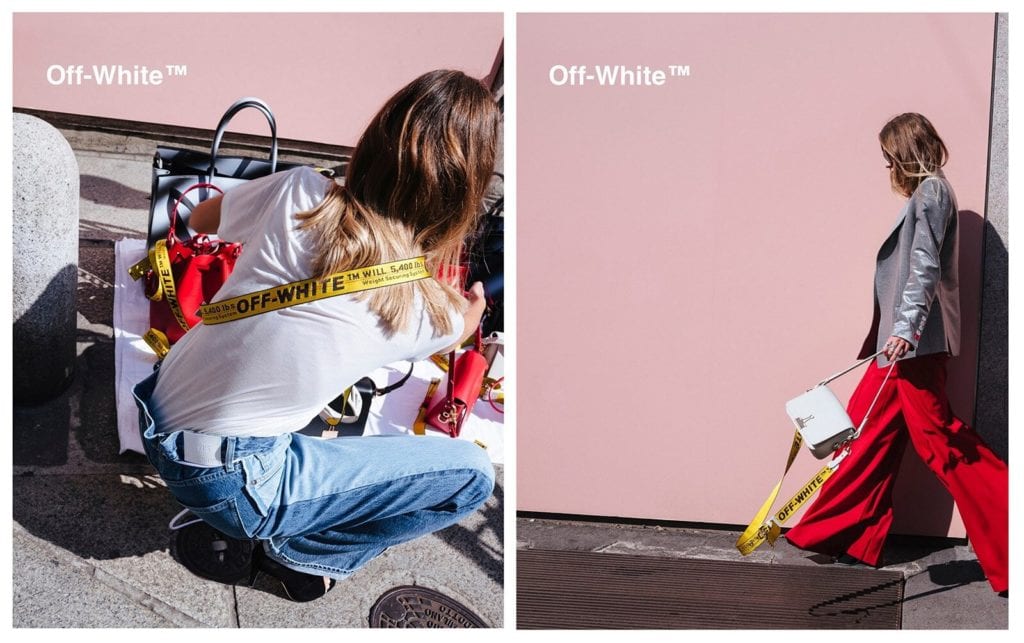Surprising news broke earlier this month. New Guards Group, the fashion group founded in 2015 by DJ-slash-designer Marcelo Burlon, Claudio Antonioli of multi-brand boutique antonioli.eu, and fashion production and distribution mastermind Davide de Giglio, has been snapped up by online retailer Farfetch for a cool $675 million. The announcement – which prompted the not-yet-profitable London-based FarFetch’s New York Stock Exchange-traded stock to drop 40 percent in after-hours trading – has prompted increased attention to the workings of the buzziest brand under the New Guards umbrella: Off-White.
A handful of brand names are routinely tossed around when talk turns to New Guards. Burlon’s eponymous brand, of course, comes under the Group’s ownership wing. There is also Heron Preston and Palm Angels, two of the better known entities associated with the Group. Still yet, New Guards has Unravel Project, A Plan Application, and Alaniu on its masthead, so to speak, among a few other names in which it maintains varying ownership stakes. But the unabashed stand out property for the Group – which describes itself “as an accelerator of innovative fashion brands,” according to its LinkedIn page – is Virgil Abloh’s 7-year old venture, which has long been affiliated with Burlon and co.
To date, the relationship between Abloh’s brand and New Guards has largely existed under the radar. However, with the news of the Farfetch acquisition, the exact nature – and structure – of the parties’ deal has found itself at the center of the conversation. Questions abound as to how the acquisition of New Guards will impact Off-White, for instance; what the Off-White ownership structure will look like once the Farfetch deal closes; and whether the two parties will remain in whatever deal they have fashioned for themselves, and if they do, for how long?
Much of that discussion has prompted media outlets to declare that New Guards is Off-White’s “parent company,” that it “owns” Off-White, and most egregiously, “Virgil Abloh doesn’t own Off-White, but he owns its trademark.
Now that the dust has settled on the big acquisition news, it is worth revisiting some of the assertions characterizing Off-White and its ownership status because for the most part, they are wrong.
First things first: the owner of Off-White’s bounty of trademark registrations (and its arsenal of common law rights, as well) is … Off-White. Or better yet, it is Off-White LLC, an Illinois-registered limited liability company that was established in 2013 and which is owned and “managed,” according to the Illinois Secretary of State database, by Virgil Abloh.
Abloh uses those marks on an array of apparel and accessories in connection with his Off-White brand, which is precisely where New Guards comes in. As the story goes, back in the early 2010s when Abloh was moving on from his first label Pyrex to the label that is now Off-White, he “teamed up with New Guards Group to start Off-White,” per Highsnobiety. And it is with the help of the Group – which provides its affiliated brands with “shared services,” such as the group’s design, manufacturing/production, and brand development capabilities – that Off-White has blossomed.
Formally speaking, the relationship between the two is one founded in licensing. A rep for Off-White revealed shortly after the news of the Farfetch acquisition of New Guards that “NGG is [Off-White’s] exclusive licensee pursuant to a multi-year agreement,” an agreement that BoF reported “runs through 2035, and cannot be renegotiated or terminated before 2026.” Neither New Guards nor Off-White break down the logistics of that formal deal.
However, traditionally speaking (and there is, of course, no saying that anything Off-White does is traditional or by the book), licensing deals – which are extremely common in the upper echelon of the fashion industry, as they enable brands to diversify their businesses offerings and generate revenue from things other than their internally-made products – see brands trade off the right to use their names and logos (i.e., their trademarks) in certain goods categories in exchange for a lump sum payment, as well as oft-hefty royalties.
This is why Luxottica, for instance, has the right to sell eyewear bearing the trademarks of Burberry, Chanel, Dolce & Gabbana, Giorgio Armani, Prada, Valentino, and Versace, etc., and log the sales of these branded glasses to its own books … after paying a sum to those companies at the outset of their deals and paying out the relevant percentage-of-sales royalty fees. In furtherance of such deals, Luxottica creates and manufactures the products, and controls the distribution for the products (both by way of third-party e-commerce sites and brick-and-mortar stores), among other things.
By entering into a licensing agreement with Luxottica, Chanel, for example – which maintains exclusive ownership for its name and various logos for use on eyewear – is not giving up any portion of that ownership. Instead, it is simply granting Luxottica the right to use that intellectual property in connection with a certain type of goods/services – eyewear, and likely also, the marketing and sale of eyewear – for a certain period of time, potentially a few years or so, and in a certain geographic region or regions.
In lieu of such an arrangement, if Luxottica were to sell eyewear bearing Chanel’s name, Chanel could sue the company for trademark infringement (and win) since the Paris-based brand maintains exclusive rights over the use of its name on eyewear, as well as and on clothing, fragrances, cosmetics, bags, etc.
The specifics of the Off-White, New Guards licensing deal are unclear (although, if language on the Off-White website is any indication, New Guards appears to be tasked with the e-commerce site’s “management and coordination,” while the copyrights for the site, itself, remain with Off-White). However, what is perfectly clear is that its New Guards deal, itself, does not impact Off-White’s ownership of its trademark rights (or any of its other intellectual property rights) or of its ownership of its company as a whole.













